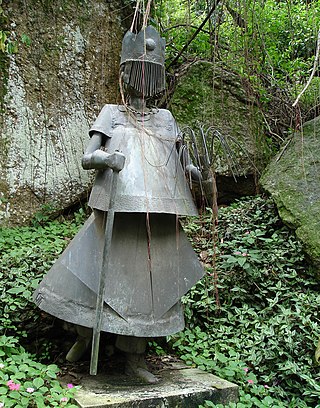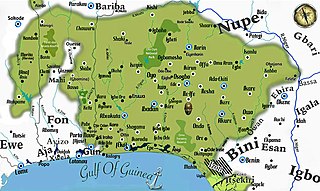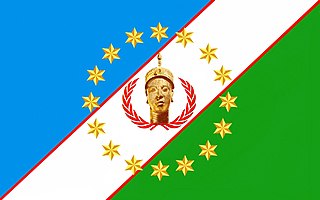Related Research Articles

Ọya is an Orisha of winds, lightning, and violent storms. As a river deity she is also regarded as a deity of children, able to provide children to her devotees or those who come to her banks at the Niger river.
Yoruba is a Niger-Congo language that is spoken in West Africa, primarily in Southwestern and Central Nigeria. It is spoken by the Yoruba people. Yoruba speakers number roughly 47 million, including about 2 million second-language speakers. As a pluricentric language, it is primarily spoken in a dialectal area spanning Nigeria, Benin, and Togo with smaller migrated communities in Côte d'Ivoire, Sierra Leone and The Gambia.

Ogbomosho is a city in Oyo State, south-western Nigeria. It was founded in the mid 17th century. The population was approximately 655,517 in 2024. It is the second largest city in Oyo State and also among the most populated in Nigeria. It is the 3rd most populated city in South Western Nigeria after Lagos and Ibadan. The City itself has 5 local governments, which makes it one of the largest cities in Nigeria. Although the principal inhabitants of the city are the Yoruba people, there are people from other parts of Nigeria and other West African countries who are residents in the city.

Yorubaland is the homeland and cultural region of the Yoruba people in West Africa. It spans the modern-day countries of Nigeria, Togo and Benin, and covers a total land area of 142,114 km2 (54,871 sq mi). Of this land area, 106,016 km2 (74.6%) lies within Nigeria, 18.9% in Benin, and the remaining 6.5% is in Togo. Prior to European colonization, a portion of this area was known as Yoruba country. The geo-cultural space contains an estimated 55 million people, the majority of this population being ethnic Yoruba.

The Oyo Empire was a Yoruba empire in West Africa. It was located in present-day southern Benin and western Nigeria. The empire grew to become the largest Yoruba-speaking state through the organizational and administrative efforts of the Yoruba people, trade, as well as the military use of cavalry. The Oyo Empire was one of the most politically important states in Western Africa from the mid-17th to the late 18th century and held sway not only over most of the other kingdoms in Yorubaland, but also over nearby African states, notably the Fon Kingdom of Dahomey in the modern Republic of Benin on its west.

The Rev. Samuel Johnson was an Anglican priest and historian of the Yoruba.

Alaafin, or The custodian of the Palace in the Yoruba language, is the title of the king of the medieval Oyo empire and present-day Oyo town of West Africa. It is the particular title of the Oba (king) of the Oyo. It is sometimes translated as "emperor" in the context of ruler of empire. He ruled the old Oyo Empire, which extended from the present-day Benin republic to Nigeria, originating from states in the South East and West to the North. The people under him are called Yoruba people and spoke the Yoruba Language.

Ọ̀rànmíyàn, also known as Ọranyan, was a legendary Yoruba king from the kingdom of Ile-Ife, and the founder of the Benin Kingdom and the Oyo Empire. Although he was the youngest of the descendants of Oduduwa, he became the prime heir of Oduduwa upon his return to claim his grandfather's throne.
Aláàfin Òjìgí was a warlike Aláàfin of the Oyo Empire in the early 18th century.
Àjàgbó was a warlike Aláàfin of the West African Oyo Empire, who allegedly reigned for 140 years in the seventeenth century.
Ódárawu was an Aláàfin of the Oyo Empire, who ruled briefly during the seventeenth century. He was the first Aláàfin recorded to be dethroned by the Oyo Mesi
Jayin was a unpopular Aáàfin of the Oyo Empire, who was ordered to commit suicide by the Oyo Mesi after having killed his own son.

The documented history begins when Oranyan came to rule the Oyo Empire, which became dominant in the early 17th century. The older traditions of the formerly dominant Ile-Ife kingdom are largely oral.

The Yoruba people are a West African ethnic group who mainly inhabit parts of Nigeria, Benin, and Togo. The areas of these countries primarily inhabited by the Yoruba are often collectively referred to as Yorubaland. The Yoruba constitute more than 50 million people in Africa, are over a million outside the continent, and bear further representation among members of the African diaspora. The vast majority of the Yoruba population is today within the country of Nigeria, where they make up 20.7% of the country's population according to Ethnologue estimations, making them one of the largest ethnic groups in Africa. Most Yoruba people speak the Yoruba language, which is the Niger-Congo language with the largest number of native or L1 speakers.
The Itsekiri language is a major branch of the Yoruboid group of languages, which as a group, is a key member of the Volta–Niger sub-family of the Niger–Congo family of African languages. Itsekiri is spoken by nearly 1,000,000 people in Nigeria as a first language and by many others as an additional language notably in the Niger Delta and in parts of Edo and Ondo states of Nigeria. The other key members of the Yoruboid group are Yoruba and Igala along with the various Yoruba dialects spoken in Benin and Togo.
The Ilorin Emirate is a traditional state based in the city of Ilorin in Kwara State, Nigeria. It is largely populated by the Yoruba-speaking people, though the kingdom is a hybrid state due to the influence of the many other tribes that make up the city.
Afonja of Ilorin was the "Are-Ona-Kakanfo", or chief military leader, of the Oyo Empire. Laderin, the great-grandfather of Afonja, was the founder of Ilorin city. He was succeeded by his son, Pasin, a powerful warrior who became a threat and target to, Basorun Gaha, because of his rising profile. He was driven into exile and killed. Alagbin, his son was made Baale. After the death of Alagbin, his son, Afonja, took over. These were the only four Yoruba baale in Ilorin.
Onisile was an Alaafin of the Yoruba Oyo Empire during the eighteenth century.

The Oyo Mesi is the privy council of Oyo, a Yoruba traditional state in Southwestern Nigeria. It dates to the medieval period, when it served as the government of a powerful pre-colonial state that was known as the Oyo empire.
Alaafin Atiba Atobatele was a king of the Oyo Empire. He was the son of King Abiodun of Oyo, and Eni-olufan from Akeitan.
References
- ↑ Johnson, Samuel (August 2011). The history of the Yorubas : from the earliest times to the beginning of the British Protectorate. ISBN 0948390891. OCLC 989713421.
- ↑ Law, R. C. C. (1971). "The constitutional troubles of Ọyọ in the eighteenth century". The Journal of African History. 12 (1): 25–44. doi:10.1017/s0021853700000050. ISSN 0021-8537.